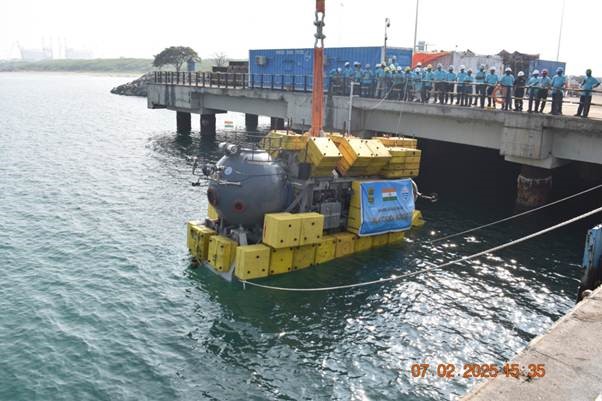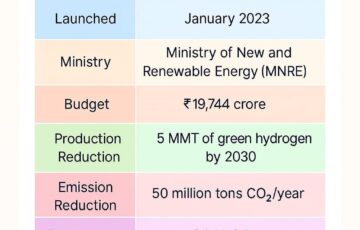Matsya-6000: India’s Deep-Ocean Submersible Successfully Completes Wet Testing
Why in the News?
Matsya-6000, India’s fourth-generation deep-sea submersible, successfully completed wet testing at Kattupalli Port. Developed under the Samudrayan Project, it will undergo 500-meter depth trials by late 2025, advancing India’s deep-ocean exploration under the Deep Ocean Mission.
Development and Key Features:
- Matsya-6000, a 4th generation deep-ocean submersible, is being developed under the Samudrayan Project by the National Institute of Ocean Technology (NIOT) under the Deep Ocean Mission.
- It is designed to carry three humans within a 1-meter diameter spherical hull for deep-sea exploration.
- Key components include:
- Main ballast system for diving and surfacing.
- Thrusters for movement in all directions.
- Battery bank for power and syntactic foam for buoyancy.
- Advanced control systems, navigation devices, and communication systems (acoustic modem, underwater telephone, VHF, GPS).
- Life-support systems, lighting, cameras, and oceanographic sensors integrated inside the hull.
Wet Testing and Performance Evaluation
- After successful dry tests, Matsya-6000 underwent wet testing at L&T Shipbuilding, Kattupalli Port (Jan 27 – Feb 12, 2025).
- Tests assessed:
- Power and control systems.
- Floatation, stability, and maneuverability (forward & reverse motion).
- Human safety and life-support systems.
- Navigation, communication, and scientific payload functionality.
- The demonstration included eight dives (five unmanned, three manned).
- Some communication limitations were noted due to restricted harbour depth.
Key Facts about Samudrayaan Mission
- India’s first manned deep-ocean exploration mission.
- Aims to develop a self-propelled submersible capable of carrying three humans to 6,000 meters depth for scientific exploration.
- Equipped with advanced sensors and tools for deep-sea resource study and biodiversity assessment.
- Ensures minimal ecological disturbance as it is solely used for exploration.
- Part of the broader Deep Ocean Mission, supporting the Blue Economy policy of the Central Government.
- Nodal Ministry: Ministry of Earth Sciences (MoES).
Future Plans:
- Matsya-6000 will undergo further testing at 500-meter depths by late 2025 for enhanced reliability.
- Additional refinements will be made to optimize performance and communication systems in deep-sea conditions.





